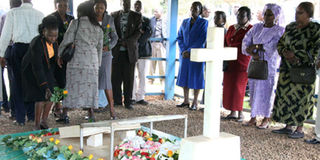New foundation to honour Muge

Relatives accompany Mrs Herma Muge (right) at the grave of Bishop Alexander Muge (below) during a prayer service to mark the 18th anniversary of his death in a road accident on August 14 , 1990. Photo/JARED NYATAYA
What you need to know:
- Muge is remembered for his political and moralistic pronouncements that often rubbed the Kanu regime the wrong way
- His death touched off a public outcry, forcing the attorney-general to order a public inquest.
Nearly two decades after he died in controversial circumstances, Anglican Church of Kenya Eldoret bishop Alexander Kipsang Muge’s family is setting up a foundation in his honour.
The project aims at honouring the role he played in Kenya’s democratisation and promotion of civil liberties. It will cater for children suffering from Aids and other disadvantaged groups.
“My husband defended the rights of the poor and the oppressed while he was alive,” says his widow Herma, 57. “It is, therefore, a fitting tribute that we recognise his efforts by keeping alive his ministry of dedication and service to others.”
The foundation idea, she explains, came after the current government, a beneficiary of the expanded democratic space, whose cause the firebrand bishop championed, failed to honour him in any way despite many promises.
Get to power
“Politicians use his name for their own gain,” says Mrs Muge. “They say he was a great man and make promises to honour him once they get to power. But they have never done anything towards this end. That is why we, as his family, decided to do this for him family.”
Bishop Muge is best remembered as the straight-talking, anti-establishment figure famous for his political and moralistic pronouncements that often rubbed the Kanu regime the wrong way. Many people believe he paid with his life for his uncompromising stand on social and political issues.
Eighteen years ago this week, he embarked on a journey he was never to return from. He was killed on his way home from a church function in Busia when a milk truck rammed into his car at Kipkaren trading centre, 30km from Eldoret town. He was 42 and a father of four.
Three days before his death, the Labour minister at the time, Mr Peter Habenga Okondo, had “banned” the bishop from visiting his constituency. The MP had sternly warned him that he “might not leave alive” if he did so.
Normal accident
Although no evidence has been presented that his death was anything but an accident, many people were, and are still, convinced that the crash was set up to eliminate him.
After all, 1990 will go down in Kenya’s history as one in which political intolerance became a by-word. This was the height of the clamour for the reintroduction of multi-party rule.
As a result, opposition leaders and government critics were easy targets of state harassment. Before then Bishop Muge had made a name for himself for speaking out against injustices.
With other clergymen such as the Rev Timothy Njoya of the Presbyterian Church of East Africa, he exerted pressure on the Moi government by bravely pointing out and denouncing its excesses.
Bishop Muge’s actions in particular rapidly drew ire from Rift Valley legislators who felt that his attacks had stretched President Moi’s patience as his diocese covered Moi’s Kabarak home area.
The bishop replied thus: “I shall not protest against the violation of human rights in South Africa if I am not allowed to protest against the violation of human rights in my own country.”
He refused to see himself through the narrow lenses of ethnic affiliation characteristic of the politics of the day. And he denounced his castigators by reminding them that “I am a spiritual leader with pastoral responsibilities over many tribes in my diocese.”
The clergyman persisted in his attacks on the Government and, in a sermon spelt out his understanding of his role by saying: “I say things other people don’t want to say simply because they will get into trouble with politicians.” It is such pronouncements, many believe, that led to his death.
Public inquest
His death touched off a public outcry, forcing the attorney-general to order a public inquest. However, the inquiry did not turn out any fresh information, and its report was never been made public.
The driver of the truck was, however, charged with causing death by dangerous driving. Nicaroni Omukoba was sentenced to seven years’ imprisonment, but he appealed against the sentence. However, he died before the appeal could be heard.
“We thought that, with the coming of the Narc government they would call for a fresh inquest,” says Mrs Muge. “However, the new government did not show any interest in the idea.”
Sadly, the ideals of truth, justice and equality which Bishop Muge valiantly stood and fought for, are yet to be achieved. Kenyan is riddled with tribalism and gross inequalities which are threatening to tear it apart.
“I can’t help feeling sometimes that his death was in vain,” Mrs Muge says. “For if the ideals he fought for had been achieved, we would not have witnessed the intolerance and hatred that led to the deaths of so many people after last year’s General Election.”




